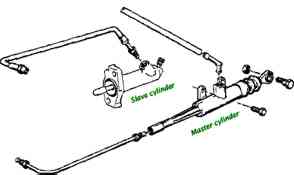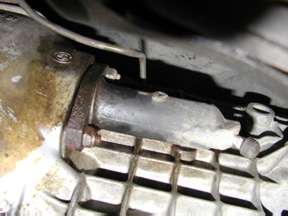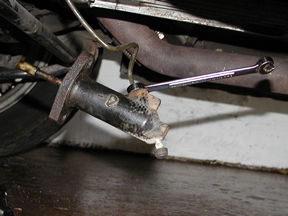|
|
|
Cost: $50
Difficulty: |
|
|
|
The Bmw E34 clutch is hydraulically piloted by a master and a slave
cylinder. No adjustment is needed or possible. The hydraulic clutch
uses brake fluid. There's no such thing as "clutch fluid" - you'll
get laughed at if you go into an auto parts shop asking for it.
A leak can often be seen at the reservoir/clutch master cylinder,
at the other end of the clutch hydraulic line, at the clutch slave
cylinder, or inside the car behind the clutch pedal.
Failure syndromes:
• Clutch pedal all the way to the floor, impossible to change
gears.
• Clutch reservoir is consistently low you probably have a
leak.
Warnings: Take care not to spill brake fluid on yourself or the
car's paint - it's highly corrosive. Wash your hands and wipe any
spills with a rag.
|
| |
| Master cylinder |
- 10mm flare nut brake wrench (like a closed end wrench with an
opening).
- WD 40.
- Brake fluid and syringe.
1. Remove the brake fluid inside the brake reservoir, using a clean
syringe.
2. Inside the car, remove the plastic cover above the pedals.
3. The master cylinder is above the clutch pedal. To remove the
fluid out of the master cylinder, you can disconnect the hose of
the slave cylinder and press the clutch pedal.
4. Loosen all the bolts holding the master cylinder then remove
the eccentric bolt connecting the cylinder to the pedal, remove
the remaining bolts.
5. Disconnect the hose coming into the middle of the cylinder. The
tricky part is to remove the lower bolt, holding the metal clutch
line: you HAVE to use a special brake wrench (flare nut wrench)
and WD40. This nut is hard to loosen and I found it not accessible
from the engine compartment, I pulled a little bit on the cylinder
from the inside (in an uncomfortable position) and used the wrench
to loosen the nut.
6. Install the new cylinder and adjust the eccentric nut for clutch
pedal height.
7. Fill up the brake reservoir with new brake fluid and bleed the
clutch.
|
| Slave cylinder |
- 10mm flare nut brake wrench (like a closed end wrench with an
opening).
- WD 40 and 13mm socket and ratchet + 13mm closed end wrench.
- Brake fluid, syringe and pan.
- Ramps or stands.
|
| 1. Place the car on ramps or stands. Remove the brake
fluid inside the brake reservoir, using a clean syringe. |
|
|
2. Under the car, loosen the clutch line nut (if you can), then
remove the 2x 13mm bolts holding the cylinder to the transmission.
For the top one, I used a ratchet with a 13mm socket a U-joint and
an extention. |
| 3. Place a pan under the transmission to catch the brake fluid then
detach the metal line from the cylinder. |
|
4. Replace the cylinder with the new one, lightly grease
the plastic tip of the pushrod with molybdenum grease and put everything
back in place.
Never ever push the clutch pedal with the
slave cylinder removed! (I did it once...)
5. Bleed the clutch. (good luck if you don't have a pressure bleeder) |
| |
| Bleeding procedure |
Bleeding is easier if you have a brake pressure bleeder,
but it is feasible without fancy tools.
Bleeding the clutch is done at the slave cylinder's end. The procedure
isn't the same as bleeding brakes. Do as if you were bleeding brakes
than you will feel that the pedal doesn't come back. If this happens,
bring the clutch pedal up, unbolt the slave cylinder and let the cylinder
rod extend itself. Then put it back in place. This will force the
brake fluid inside the cylinder. |
|

|
|
 |
|
|
|
|
©2000 BMWE34.net
|
-
Home of the Bmw 518i, 520i, 524td, 525tds, 525i, 535i, 530i, 540i,
M5 and other Bmw E34 chassis -
|
|


